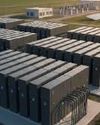Energy sector boom drives growth in cooling towers market
EPR Magazine (Electrical & Power Review)
|June 2025
According to IMARC Group, the market is forecast to grow steadily, reaching $0.40 billion by 2033, at a compound annual growth rate (CAGR) of 5.10% from 2025 to 2033.
-

The push towards rapid industrialisation, infrastructure modernisation, and sustainable energy solutions in India is reshaping several associated markets, such as the cooling tower sector. As of 2024, the India cooling towers market is valued at $0.27 billion. It is forecast to grow steadily, reaching $0.40 billion by 2033 at a compound annual growth rate (CAGR) of 5.10 percent during 2025-2033, according to IMARC Group. This promising trajectory is underpinned by increasing investments in infrastructure, renewable energy deployment and industrial expansion, all of which demand efficient, scalable and environment-friendly cooling systems.
Market Overview
Cooling towers, crucial for managing heat dissipation in power generation, HVAC, and industrial processes, are becoming integral to India's energy transition and urban development strategy. The market's growth reflects a strategic shift towards energy-efficient systems that reduce operational costs and meet environmental compliance. From the construction of smart cities to the deployment of concentrated solar power (CSP) plants, cooling towers are increasingly in demand for both traditional and emerging applications. Their heat exchange and energy conservation role is vital in the oil and gas and power generation sectors.
Renewable Energy Expansion
Renewable energy ambitions are fast-tracking the integration of cooling technologies in clean energy infrastructure. The Solar Energy Corporation of India (SECI) announced a significant milestone in 2024—a 500 MW CSP storage project intended to supply round-the-clock green energy. Unlike photovoltaic solar panels, CSP plants generate thermal energy using mirrored arrays and require cooling towers for heat rejection, even during non-sunlight hours.
यह कहानी EPR Magazine (Electrical & Power Review) के June 2025 संस्करण से ली गई है।
हजारों चुनिंदा प्रीमियम कहानियों और 10,000 से अधिक पत्रिकाओं और समाचार पत्रों तक पहुंचने के लिए मैगज़्टर गोल्ड की सदस्यता लें।
क्या आप पहले से ही ग्राहक हैं? साइन इन करें
EPR Magazine (Electrical & Power Review) से और कहानियाँ

EPR Magazine (Electrical & Power Review)
Wirepas certification a major step toward India's upcoming phase of AMI deployments
The Wirepas Certified programme is a major advancement for India's massive AMI deployments. This affirms device suitability for the diverse and challenging environments in the country. Teppo Hemiä, CEO of Wirepas discusses more with EPR.
2 mins
December 2025

EPR Magazine (Electrical & Power Review)
BESS becoming the backbone of power capacity additions
India is undergoing a rapid clean energy revolution, aiming to deploy 500 GW of non-fossil capacity by 2030, of which it has already reached 250 GW.
6 mins
December 2025

EPR Magazine (Electrical & Power Review)
Transformer industry undergoes evolution to meet capacity addition
The projected increase of over 433,000 MVA in substation capacity nationwide has served as a guiding force for the transformer sector. Amit Varshney shares his expertise in talks with EPR.
3 mins
December 2025

EPR Magazine (Electrical & Power Review)
RenewSys elevates solar module reliability with advanced encapsulant technologies
To enhance the efficiency and reliability of its products, RenewSys has introduced advanced encapsulants and backsheets, including AA EVA (Anti-Acid) to combat internal corrosion, ENT POE to guarantee PID-free performance, and environmentally friendly options like the Green Backsheet.
2 mins
December 2025
EPR Magazine (Electrical & Power Review)
REC facilitates MoU between MePDCL and CPRI for quality testing in Meghalaya
REC Limited, a Maharatna Public Sector Enterprise under the Ministry of Power and a leading NBFC, has successfully mediated a crucial Memorandum of Understanding (MoU) between Meghalaya Power Distribution Corporation Limited (MePDCL) and the Central Power Research Institute (CPRI).
1 min
December 2025

EPR Magazine (Electrical & Power Review)
SECI, Andhra finalise 1200 MWh BESS and 50 MW hybrid project
Solar Energy Corporation of India Limited (SECI), a Navratna CPSU under the Ministry of New & Renewable Energy (MNRE), Government of India, has exchanged Government Orders (GOs) with the Government of Andhra Pradesh for the development of a 1200 MWh Battery Energy Storage System (BESS) at Nandyal and a 50 MW Hybrid Solar Project.
1 min
December 2025

EPR Magazine (Electrical & Power Review)
Convergence of digitalisation, automation, and electrification is the foundation of next-gen infra
Panasonic Life Solutions India is on a mission to contribute to reliable, sustainable electrification across various sectors in the country. Shahab Naqvi shares insights about the company's strategies in talks with EPR. Let us know more from him.
3 mins
December 2025

EPR Magazine (Electrical & Power Review)
FY26 to attract $20-25 bn in renewable investments in India
The renewable energy sector in India has just hit a turning point. Between April and August 2025, the country added a record 20.1 gigawatts (GW) of renewable power capacity, a 123 per cent increase compared to the same period last year, when additions totalled just 9 GW. According to data from the Ministry of New and Renewable Energy (MNRE) and market observers like ICRA, this pace positions India to cross 35 GW of new capacity by the end of FY26, the highest annual addition in its clean-energy history.
3 mins
December 2025

EPR Magazine (Electrical & Power Review)
Wirepas certification a major step toward India's upcoming phase of AMI deployments
This certification provides DISCOMs and AMISPs with confidence that a device has passed the toughest real-world tests for scalability, interoperability and reliability.
2 mins
December 2025

EPR Magazine (Electrical & Power Review)
Renewable surge strains the grid as storage strengthens stability
The CEA mandates co-located ESS (approx. 2 hours) for new solar projects, aiming to reach 60 GW of storage by FY 2032 (including 42 GW of BESS and 19 GW of pumped hydro).
3 mins
December 2025
Listen
Translate
Change font size

